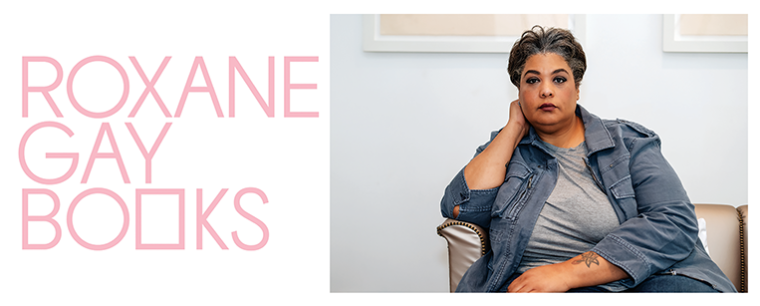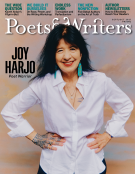In the past decade literary polymath Roxane Gay has penned two story collections, the essay collection Bad Feminist, Hunger: A Memoir of (My) Body, and the novel An Untamed State, all to acclaim. She has written for Marvel Comics, opined for the New York Times, and overseen a magazine for Medium, not to mention her editing of indie stalwarts like PANK and the Rumpus and serving as series editor for the Flannery O’Connor Award for Short Fiction with the University of Georgia Press. On “literary Twitter” she’s something of a godmother to the writing community: insightful, candid, and funny, a champion for new voices. Now to this résumé she adds acquiring editor for a publishing house, as she brings her acumen to helm Roxane Gay Books, a new imprint of Grove Atlantic announced in May.

Writer and editor Roxane Gay announced news of her imprint in May 2021. (Credit: Reggie Cunningham)
Roxane Gay Books will put out three titles a year, at least to start, with the aesthetically omnivorous Gay casting a wide net in terms of the submissions she’s seeking—story and essay collections, novels in a variety of genres, as well as nonfiction and memoirs. (No YA, as of yet, or poetry.) What Gay is not necessarily looking for is prior publishing experience, blurbs, a social media platform, an agent, an MFA, or a college degree. Nor is there a fee to submit. In dispensing with these requirements, Gay intends to invite submissions from writers traditionally locked out of publishing opportunities: namely, people with the talent and discipline to write a powerful work of art but not the connections or opportunities that come with being college educated, white, upper middle class, or located in New York City, the industry’s seat.
While the imprint’s submissions process is deliberately inclusive, Gay plans on bringing a clear and intentional editorial point-of-view to the manuscripts she selects. In her newsletter, the Audacity, she writes of her objectives, “This is not an imprint that will try to be everything to everyone. Universality is not the goal.”
“I’m going to publish books that I love,” Gay said in a recent call over Zoom, “and that I feel as an editor I can bring something valuable to. I am also very invested in making space for Black women, queer women, queer writers, and writers of color broadly—writers whom we don’t see enough of in mainstream publishing, despite the prevailing attitudes toward diversity.”
In addition to working with authors on edits and revisions, Gay will help them navigate their book launch and beyond. She herself was grateful to receive guidance early on in her career from novelist Tayari Jones, who, Gay recalls fondly, actually called her on the phone to share industry advice. “I think it’s important for writers to understand that publishing is a business, and it needs to be approached as such,” she says. “I’m happy to give mentorship since I’ve published five or six books, with more coming, so I think I have a good sense of how it works, a little.”
This imprint is not the only way Gay is disrupting typical industry practices. A fellow will help her sift through submissions and will split their time working for Roxane Gay Books and rotating through the editorial, publicity, marketing, and rights divisions at Grove Atlantic. At each stop the fellow will receive a crash course in how the department works and have a dedicated support person overseeing them on real projects. “They won’t just be putting together mailings,” says Amy Hundley, a vice president of Grove Atlantic, Gay’s own editor at the publisher, and Gay’s collaborator for the imprint.
Hundley says that, over the years, she and Gay have often talked about the lack of diversity in publishing, which is in significant part an economic issue. “A lot of times when people talk about diversity and inclusion in publishing, they say it’s a pipeline problem, but it’s not a pipeline problem; it’s that people can’t afford to live on the entry-level salaries that publishing pays,” says Gay.
Those positions favor applicants with previous experience via unpaid industry internships, thereby further entrenching the need for generational wealth and support in order to get a toehold in the industry. Hundley says, “I’m hiring people right now, and I’m seeing résumés with like six internships on them. The fellowship is a way of reconceiving the internship idea.”
The fellowship provides a $25,000 stipend for one year of part-time work, along with eligibility for benefits and paid time off. With another part-time job, a person could manage to afford living in New York City and, at the end of the year, emerge with a broad understanding of how a publishing house operates. Hundley hopes this will allow the fellow to “focus on finding a place in the piece of the publishing industry that works for them.”
Taken together, Roxane Gay Books and the Grove Atlantic fellowship is a small but important endeavor to combat the chokehold of white and upper-middle-class hegemony not just in the literary marketplace, but behind the scenes at the publishing-house level. But as Gay herself is the first to admit, this imprint, along with a few others led by Black women, are not enough; on the Audacity she wrote we won’t see real change “until the industry makes this kind of initiative the rule rather than the exception.”
Still, Gay is excited to begin modestly and see what comes through the submissions, which opened this summer via Submittable; Gay plans to look at all of them. “We’re going to publish three great books a year, so you can read them all!
Brian Gresko is a writer based in Brooklyn, New York, where he co-runs Pete’s Reading Series.









